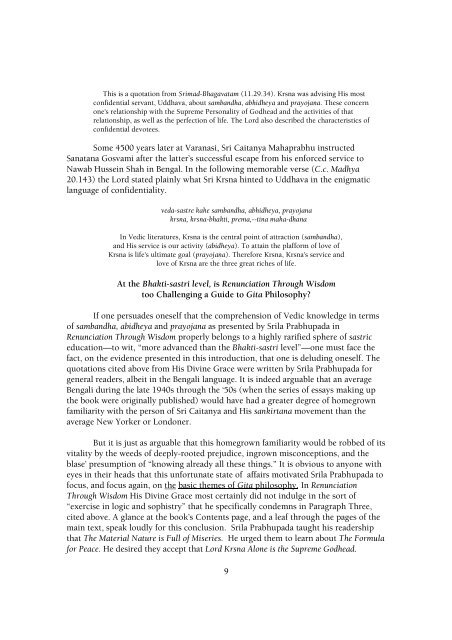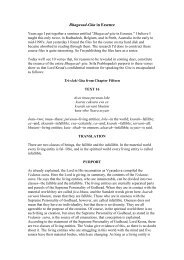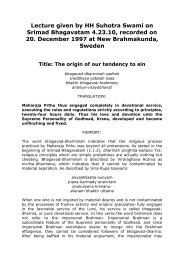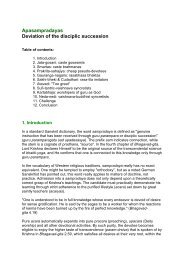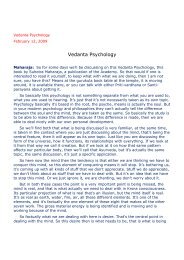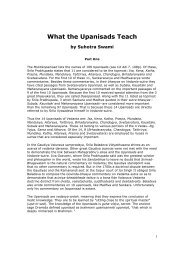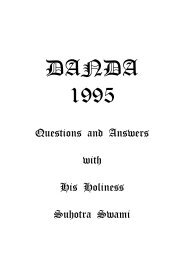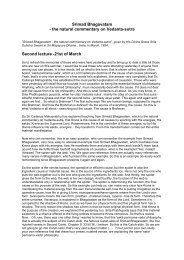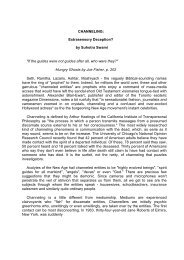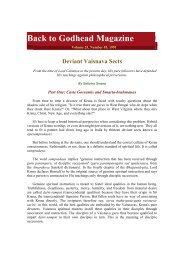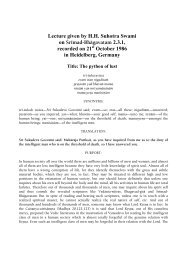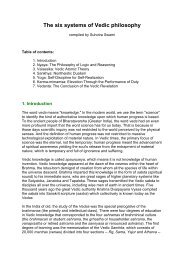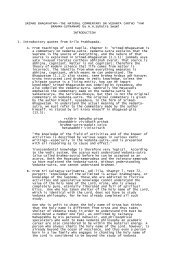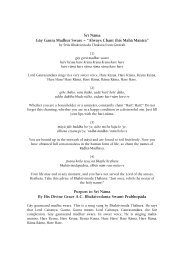Bhakti Sastri intro Suhotra Maharaja the printed version
Bhakti Sastri intro Suhotra Maharaja the printed version
Bhakti Sastri intro Suhotra Maharaja the printed version
Create successful ePaper yourself
Turn your PDF publications into a flip-book with our unique Google optimized e-Paper software.
This is a quotation from Srimad-Bhagavatam (11.29.34). Krsna was advising His mostconfidential servant, Uddhava, about sambandha, abhidheya and prayojana. These concernone's relationship with <strong>the</strong> Supreme Personality of Godhead and <strong>the</strong> activities of thatrelationship, as well as <strong>the</strong> perfection of life. The Lord also described <strong>the</strong> characteristics ofconfidential devotees.Some 4500 years later at Varanasi, Sri Caitanya Mahaprabhu instructedSanatana Gosvami after <strong>the</strong> latter’s successful escape from his enforced service toNawab Hussein Shah in Bengal. In <strong>the</strong> following memorable verse (C.c. Madhya20.143) <strong>the</strong> Lord stated plainly what Sri Krsna hinted to Uddhava in <strong>the</strong> enigmaticlanguage of confidentiality.veda-sastre kahe sambandha, abhidheya, prayojanakrsna, krsna-bhakti, prema,--tina maha-dhanaIn Vedic literatures, Krsna is <strong>the</strong> central point of attraction (sambandha),and His service is our activity (abidheya). To attain <strong>the</strong> plafform of love ofKrsna is life's ultimate goal (prayojana). Therefore Krsna, Krsna's service andlove of Krsna are <strong>the</strong> three great riches of life.At <strong>the</strong> <strong>Bhakti</strong>-sastri level, is Renunciation Through Wisdomtoo Challenging a Guide to Gita Philosophy?If one persuades oneself that <strong>the</strong> comprehension of Vedic knowledge in termsof sambandha, abidheya and prayojana as presented by Srila Prabhupada inRenunciation Through Wisdom properly belongs to a highly rarified sphere of sastriceducation—to wit, “more advanced than <strong>the</strong> <strong>Bhakti</strong>-sastri level”—one must face <strong>the</strong>fact, on <strong>the</strong> evidence presented in this <strong>intro</strong>duction, that one is deluding oneself. Thequotations cited above from His Divine Grace were written by Srila Prabhupada forgeneral readers, albeit in <strong>the</strong> Bengali language. It is indeed arguable that an averageBengali during <strong>the</strong> late 1940s through <strong>the</strong> ‘50s (when <strong>the</strong> series of essays making up<strong>the</strong> book were originally published) would have had a greater degree of homegrownfamiliarity with <strong>the</strong> person of Sri Caitanya and His sankirtana movement than <strong>the</strong>average New Yorker or Londoner.But it is just as arguable that this homegrown familiarity would be robbed of itsvitality by <strong>the</strong> weeds of deeply-rooted prejudice, ingrown misconceptions, and <strong>the</strong>blase’ presumption of “knowing already all <strong>the</strong>se things.” It is obvious to anyone wi<strong>the</strong>yes in <strong>the</strong>ir heads that this unfortunate state of affairs motivated Srila Prabhupada tofocus, and focus again, on <strong>the</strong> basic <strong>the</strong>mes of Gita philosophy. In RenunciationThrough Wisdom His Divine Grace most certainly did not indulge in <strong>the</strong> sort of“exercise in logic and sophistry” that he specifically condemns in Paragraph Three,cited above. A glance at <strong>the</strong> book’s Contents page, and a leaf through <strong>the</strong> pages of <strong>the</strong>main text, speak loudly for this conclusion. Srila Prabhupada taught his readershipthat The Material Nature is Full of Miseries. He urged <strong>the</strong>m to learn about The Formulafor Peace. He desired <strong>the</strong>y accept that Lord Krsna Alone is <strong>the</strong> Supreme Godhead.9


